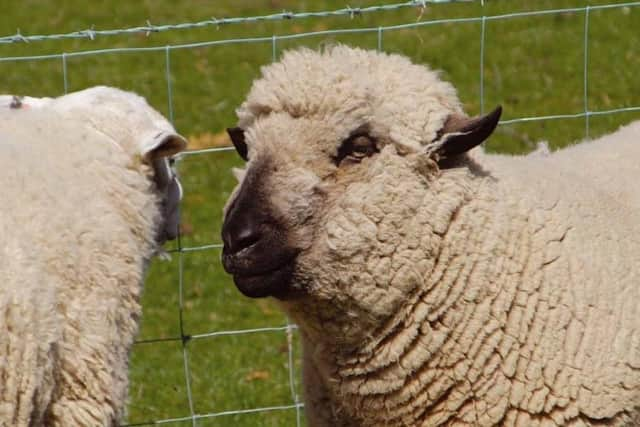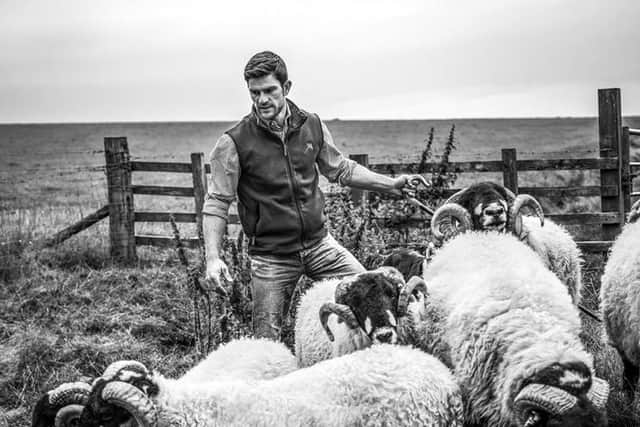Wool prices on the re-bound
and live on Freeview channel 276
However, British Wool CEO Andrew Hogley believes that the market has more to give.
He explained:“The hospitality sector, a very significant end user of the wool produced in the UK, shut down completely during the pandemic.
Advertisement
Advertisement
“Recent months have seen the likes of hotels and cruise line operators starting to invest again in their businesses.


“As a consequence of this, demand for high quality woollen carpets is increasing.”
Hogley continued:“This is good news for farmers, who will benefit from a stronger wool price in 2022.
“And we want to build on this for the future.”
Hogley also holds the position of CEO at Ulster Wool, which is based at Muckamore in Co Antrim.
Advertisement
Advertisement


“Our aim is to make wool production a profitable enterprise for sheep producers,” he further explained.
“And to make this happen the prices that we pay must cover the farmers’ shearing costs while also leaving an additional margin.”
Hogley believes that the co-operative structure of British and Ulster Wool represents the best model to allow this happen.”
He continued:“We are a farmer-owned business. By representing the combined interests of wool producers throughout the UK, we bring many strengths to the market place.
Advertisement
Advertisement


“Scale of operation is one of these: the ability to carry out marketing activities on behalf of an entire sector is another.
“British and Ulster Wool operates solely to secure the best possible prices that it can get for its farmer-members.
“Once our costs have been covered all the rest of the money goes back to the farmer members.”
Grading is at the very heart of the entire British and Ulster Wool operation. It is a process that allows the company to convert a single farmer’s wool clip, which can be measured in kilos, into lots that are suitable for sale at auction. Each of these weighs 8,000kg.
Advertisement
Advertisement
“This is a perfect example of farmers coming together for the greater good,” Hogley stressed.
Ulster Wool has 3,500 members. It handles between 55 and 60% of Northern Ireland’s wool clip.
Andrew Hogley again:“Ulster Wool is committed to working on behalf of all sheep farmers. A perfect example of this was the lobbying effort undertaken to secure a Covid wool support package.
“Last July farm minister Edwin Poots agreed a £1.2m support package for wool. Every sheep producer in Northern Ireland was eligible for the scheme, which was devised on the back of the specific input and information supplied by the team at Ulster Wool.”
Advertisement
Advertisement
He further explained: “This is a perfect example of what can be achieved when farmers come together on a co-operative basis.”
Significantly, Andrew Hogley believes that the British Wool auction system remains fit for purpose in a post-pandemic world.
“If anything, it is even more relevant today than was the case prior to this point,” he explained
“An increased number of organisations are now taking part in each of our 20 annual auctions. We have moved to a wholly online system, which make the entire process more effective and convenient for those participating. Moreover, demand for wool is on the increase.”
Advertisement
Advertisement
He added:“Both of the UK’s two wool scouring operations remain committed to the auction. Buyers from across Europe regularly take part in the auction. And, obviously we are keen to expand this network further.”
Prior to the pandemic almost one third of the wool sold at auction was destined for China. Andrew Hogley is very keen to build on this potential for the future but notes that this must not undermine the existing wool processing industry in the UK.
But he is quick to confirm that Covid-19 hit British Wool very hard indeed.
“The wool market floored,” he confirmed.
“We are a farmer-owned co-op, which comprises British Wool and Ulster Wool, based in Northern Ireland.
Advertisement
Advertisement
“We receive no support funding from government whatsoever. So the organisation has to stand on its own two feet from a financial point of view.”
One of the first decisions taken by the British Wool management team during the pandemic was to reduce its cost base.
To this end, the number of wool grading centres was reduced from twelve to eight.
“Muckamore in Co Antrim is the only grading centre in Northern Ireland,” Hogley commented.
Advertisement
Advertisement
“It is operated by Ulster Wool and was not impacted at all by the cost saving measures introduced across the other parts of the UK.”
Looking to the future, Andrew Hogley believes that wool will once again, become the fashion fibre of choice.
“Designers and the public at large now want to wear clothes made from natural materials. Traceability is another growing requirement within the world of fashion and design,” he said.
“The good news for sheep farmers is that British Wool delivers on both these counts.”
Advertisement
Advertisement
The British Wool CEO added:“Consumers do not want to be associated with products that pollute our oceans with micro plastics.
“Wool can be used in the production of high quality clothing, fabrics and carpets. British Wool has a tremendous story to tell. And the opportunities to do just that will present themselves in a post-pandemic world.”
Meanwhile, Ulster Wool will be making payments worth £8.4m to its members for the 2021 clip, an increase to an overall average of 36.4p/kg.
Andrew Hogley said:”The 135% average increase over the prior year is down to improved auction prices for wool over the last 12 months alongside a push to reduce operational costs.”
Advertisement
Advertisement
“With the challenges the industry is facing we are really pleased that this year’s payments are an improvement. Although the price is not yet where we would like it to be, it represents a huge recovery since the difficulties of 2020. We continue to work hard to improve returns further for our members.
“We are optimistic that the strong demand we have seen over recent months will be sustained, that the recovery in the wool market will continue through 2022, and that this will result in further price improvement for the 2022 wool clip.”
Ulster Wool’s unique collective marketing system which collects, grades and tests wool on behalf of its farmer members ensures a consistent product for buyers and manufacturers whilst maximising the prices received at auction, he explained. Alongside this, the organisation continues to drive demand for wool across the supply chain and from consumers.
Mr. Hogley continued: “Everything we do has the primary aim of adding value to Northern Ireland wool in order to boost payments to our members. As always, grade returns are determined by the average auction price for the season.”
Advertisement
Advertisement
Returns for the 2021 clip will be around 40p per kg for many core grades and around 30p per kg for Blackface wool. This is a significant improvement on 2020 prices due to sales being badly affected by the pandemic.
Some speciality types such as Bluefaced Leicester will receive significantly higher returns on average £5.50 per kg. An additional £1.00 per kg is also being paid out on most types of Organic certified wool.
“We recognise that our members have a choice to deliver wool to us. On the whole our returns are competitive relative to the prices offered by our competitors and in many cases significantly higher,” he said.
“However, unlike our competitors we don’t make a profit from wool. We sell on our members’ behalf and deduct the cost of marketing and processing. The more wool we have to sell, the lower our costs per kg and the better the returns are for all our members.”
Advertisement
Advertisement
The free haulage offer introduced in 2021 will continue this year, he added. “This means that members who take wool to any of our drop points will not be charged onward carriage.”
Other improvements introduced last year which will continue for 2022 include the lower threshold for the volume premium payment. “Clips of 2,000kg or more will continue to receive an additional 4p/kg with further incremental increases for those delivering larger volumes.”
Concluding Mr. Hogley added:“Ulster Wool’s primary aim is to maximise the value of wool for our members. Now more than ever, it is crucial that farmers work together and market their wool through Ulster Wool so that together, we can maximise returns for this year’s clip and beyond.”
British Wool is the last UK statutory marketing organisation of its type left in operation. Back in the day the likes of the former Milk Board and the Pigs Board were felt not to be fit-for purpose. However, history has since shown that decisions taken in haste can turn out to be the wrong ones in the long term.
Advertisement
Advertisement
British Wool is a farmer-owned co-operative, which operates a wholly transparent auction system on behalf of its members. The organisation also pump-primes a lot of highly relevant research and development, where adding value to wool is concerned.
For their part, dairy farmers have had no end of struggles to contend with since the shutters were drawn down on the old Milk Marketing Board. Had it survived, or some form of over-arching co-operative put in its place, local dairy farmers might well have been able to better cope with the spectre of volatility that has so haunted them over the past decade.
It’s also no coincidence that the pig industry went into free fall, once the former Pigs Marketing Board fell by the wayside.
No doubt, lots of other factors came into play when the decisions to wind-up the various marketing boards were taken. But one could make a genuine argument for the re-establishment of some form of collective marketing system right across the agri-food spectrum, given the challenges that are coming down the track.
Advertisement
Advertisement
Certainly, those arguing that Brexit will be a good news story for our farming sectors, given that we will be well placed to feed everyone in the UK, should have no bone to pick with this assertion.
British Wool remains a perfect example of the influence that farmers can bring to bear when they work together.
And it’s hard not to overlook the role played by the organisation in securing a Covid support payment for the entire wool sector.
Not every sheep farmer in Northern Ireland supplies British Wool with their fleeces: yet the organisation fought tool and nail to ensure that every sheep farmer was deemed eligible for the scheme.
This is a reality, which all flock owners should mull over as they decide on how best to sell their wool in 2022.